初中英语经典句型
- 格式:pdf
- 大小:180.91 KB
- 文档页数:17
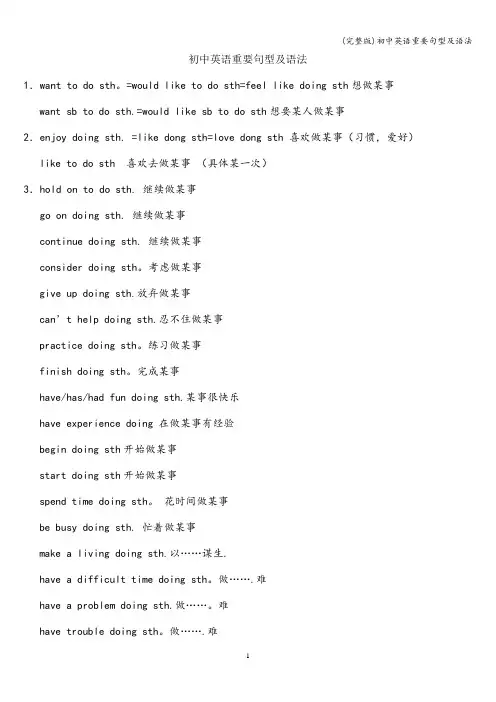
初中英语重要句型及语法1.want to do sth。
=would like to do sth=feel like doing sth想做某事want sb to do sth.=would like sb to do sth想要某人做某事2.enjoy doing sth. =like dong sth=love dong sth 喜欢做某事(习惯,爱好)like to do sth 喜欢去做某事(具体某一次)3.hold on to do sth. 继续做某事go on doing sth. 继续做某事continue doing sth. 继续做某事consider doing sth。
考虑做某事give up doing sth.放弃做某事can’t help doing sth.忍不住做某事practice doing sth。
练习做某事finish doing sth。
完成某事have/has/had fun doing sth.某事很快乐have experience doing 在做某事有经验begin doing sth开始做某事start doing sth开始做某事spend time doing sth。
花时间做某事be busy doing sth. 忙着做某事make a living doing sth.以……谋生.have a difficult time doing sth。
做…….难have a problem doing sth.做……。
难have trouble doing sth。
做…….难keep on doing sth. = keep sb. doing sth。
不停地做某事4.be good at doing sth 擅长于做某事do well in doing sth擅长于做某事thank you for doing sth 感谢做某事thanks for doing sth感谢做某事be used for doing sth 被用于做某事be used to doing sth 习惯做某事how about doing sth 做某事怎样what about doing sth 做某事怎样put off doing sth推迟做某事take pride in doing sth.以……为自豪by doing sth通过做某事be afraid to do sth害怕做某事be afraid of doing sth害怕做某事be terrified of doing sth. 害怕做某事5.be doing sth。
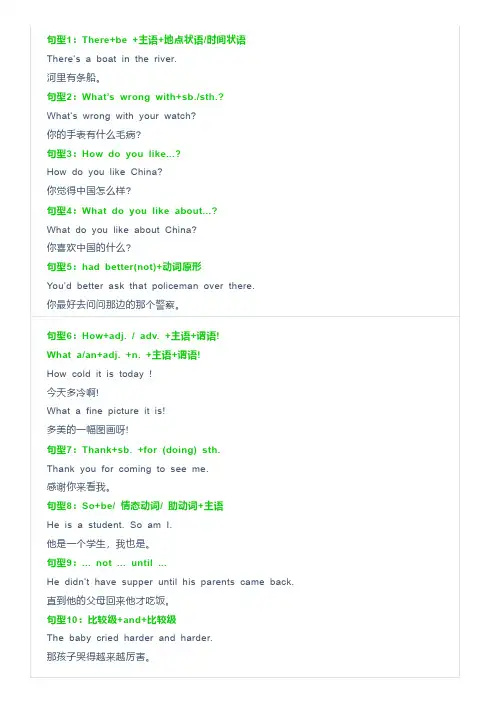
句型1:There+be +主语+地点状语/时间状语 There’s a boat in the river. 河里有条船。
句型2:What’s wrong with+sb./sth.? What’s wrong with your watch? 你的手表有什么毛病? 句型3:How do you like...? How do you like China? 你觉得中国怎么样? 句型4:What do you like about...? What do you like about China?你喜欢中国的什么? 句型5:had better(not)+动词原形 You’d better ask that policeman over there. 你最好去问问那边的那个警察。
句型6:How+adj. / adv. +主语+谓语! What a/an+adj. +n. +主语+谓语! How cold it is today ! 今天多冷啊! What a fine picture it is! 多美的一幅图画呀! 句型7:Thank+sb. +for (doing) sth.Thank you for coming to see me. 感谢你来看我。
句型8:So+be/ 情态动词/ 助动词+主语 He is a student. So am I. 他是一个学生,我也是。
句型9:... not ... until ... He didn’t have supper until his parents came back. 直到他的父母回来他才吃饭。
句型10:比较级+and+比较级 The baby cried harder and harder. 那孩子哭得越来越厉害。
句型11:the +比较级,the +比较级 The more one has,the more one wants. 越有越贪。
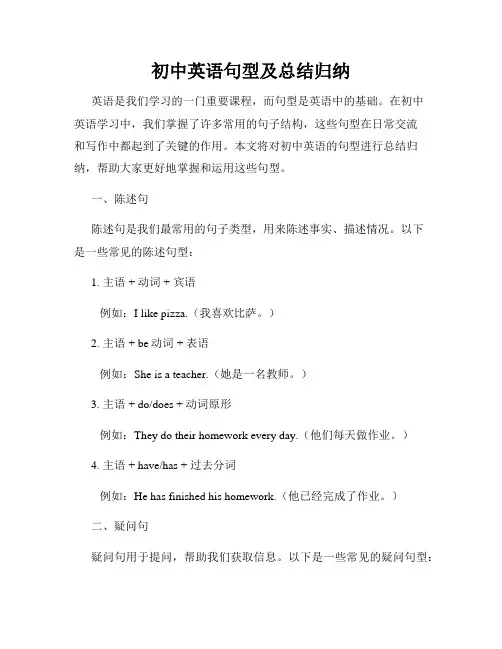
初中英语句型及总结归纳英语是我们学习的一门重要课程,而句型是英语中的基础。
在初中英语学习中,我们掌握了许多常用的句子结构,这些句型在日常交流和写作中都起到了关键的作用。
本文将对初中英语的句型进行总结归纳,帮助大家更好地掌握和运用这些句型。
一、陈述句陈述句是我们最常用的句子类型,用来陈述事实、描述情况。
以下是一些常见的陈述句型:1. 主语 + 动词 + 宾语例如:I like pizza.(我喜欢比萨。
)2. 主语 + be动词 + 表语例如:She is a teacher.(她是一名教师。
)3. 主语 + do/does + 动词原形例如:They do their homework every day.(他们每天做作业。
)4. 主语 + have/has + 过去分词例如:He has finished his homework.(他已经完成了作业。
)二、疑问句疑问句用于提问,帮助我们获取信息。
以下是一些常见的疑问句型:1. 疑问词 + 助动词 + 主语 + 动词?例如:What do you like?(你喜欢什么?)2. 助动词 + 主语 + 动词?例如:Do you play basketball?(你打篮球吗?)3. 特殊疑问句例如:Where did you go yesterday?(你昨天去哪里了?)三、祈使句祈使句用于表达请求、命令或建议。
以下是一些常见的祈使句型:1. 动词原形 + 其他成分例如:Open the window, please.(请打开窗户。
)2. 动词原形 + 不定代词/名词例如:Eat some fruit.(吃些水果。
)四、感叹句感叹句用于表达惊讶、赞美、喜悦等情感。
以下是一些常见的感叹句型:1. How + 形容词/副词 + 主语 + 动词!例如:How beautiful the flowers are!(花儿多美啊!)2. What + 形容词 + 名词 + 主语 + be动词!例如:What a lovely dog he has!(他有一只多可爱的狗啊!)五、条件句条件句用于表达假设、条件和结果之间的关系。
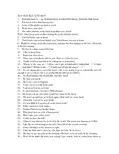
初中英语重点句型100个1、Welcome back to… eg. Welcome back to school/the factory. Welcome back home.2、It is much better than having class3、Some of the apples are hard to reach.4、Work must come first.5、The other students in the class keep their eyes closed例如:Don't keep your mother waiting Keep the students in/out.6、You had better stay at home.7、You'd better stay at hom, hadn't you? You'd better not stay at home.8、Walk(Go) along、down the road/street, and take the first turning on the left. =Turn left at the first turning9、We live in a place named Da Lian.10、I like to keep busy.11、Better late than never.12、There was a telephone call for you. Here is a letter for you.13、Thank a lot/very much/you for asking me to your party.14、Which is t he way to….?=How can I get to/reach/arrive in(at)/find….? Is therea …..near here?=Where is the…..?=Could you tell me the way to…..?15、It's too dangerous to cross the street. ( He is too young to go to school=He isn't old enough to go to school.=He is s o young that he can’t go to school.)16、the Read family= the Reads=Mr. and Mrs. Read17、the way you speak.18、He is on a visit to England.19、Come out for a walk in the park.20、I can wear it in my new hat.22、It was a pleasure ( for me).= With pleasure.21、The book cost me five yuan. I paid five yuan for the book.23、We won't go until we get it back again.(Wait until we come back)24、Chocolate is good for your heath25、Do you think it is good to do some housework?26、Either mum or I cook supper.27、Neither Dad nor my brother helps.28、Why don't men do a bit of housework?29、May I take your orders now?30、Could we have the bill?31、China is very famous for its food in the world. The poem was famous as Li Bai.32、Take the second turning on the left= Turn left at the second crossing.33、Either (Neither) of the answers is right.34、I like the film, and so dose he. (He likes the film. So he does.)35、We have to get up early in the morning =We have to be up early in the morning.36、How did he make the baby stop crying? (see ,watch, look at, notice,hear, listen to,feel ,make let ,have, help) eg. I saw her go into the house. Let me go. We noticed him come out . She was seen to go into the house.37、He told me not to bring you anything?38、finish+doing enjoy +doing be busy +doing practise +doing feel like+ doing… have fun doing sth. Can't help, be worth,He finished doing his homework. We are busy making some kites. We are going to have fun learning and speaking English this term.39、stop doing sth./stop to do sth. remember doing sth./remember to do sth. forget doing sth./forget to do sth. Eg. She stopped crying. She stopped to cry. I remember posting the letter.. I remember to post the letter. I forgot doing my homework. I forgot to do my homework.40、There are three girls walking in the park.41、We are going to have fun learning and speaking English this term.42、They have (get) some problems (difficulty) (in) doing sth.43、I don't know where he comes=I don't know. Where does he come?44、Do you know if/whether he got up early yesterday morning?= Do you know? Did he get up early yesterday morning?45、Why don't you wait for me here? = Why not wait for me here?46、He likes swimming in summer. He likes to swim.47、He found it very difficult to sleep./I think it very important to learn English well.( make,feel)48、I little (never,) dreamt of (about) seeing you here.49、I little (never) dreamt that I saw you here.50、I have been to the factory. He has gone to the factory.51、I have been in the factory for two years.52、It takes/took/will take sb. st. to do sth. eg. It took me an hour and a half to work out the difficult problem. It takes me one and a half hours to go to school on foot.53、I have two brothers. One is a worker.. The other is a doctor.54、There are lots of children playing in the park. Some are singing. Others are playing games.55、There are fifty students in our class. Thirty are girls. The others are boys.56、Let's make it 8:30/a little/a bit earlier57、He is as tall as I/me. He doesn't run as、so fast as I/me.58、He is interested in the film. The film is interesting.59、Not everyone likes sandwich.= Everyone doesn't like sandwich. Everyone likes sandwich. No one likes sandwich/None(None of them) like(s) sandwich.60、I don/t think he is right, is he? He doesn/t think you are right, does he? ( think, guess, except, suppose, imagine, believe.)61、There is little water in the bottle, is there/There is a little water in the bottle, isn't there? There are few books on the table, are there? There are a few books on the table, aren't there?62、Do you have one more to say? There are another three mooncakes left. Do you have one more to eat?63、The lights are still on. He must be at home, isn't he? He must have come here yesterday, didn't he?64、Do you mind my opening the door?65、Everybody is looking forward to May Day with great joy.66、He can't help crying.67、I am a student , aren't I?68、What's he?=What does he do?=What's his job?69、Jim is short for James70、Help yourselves to some grapes and watermelons.71、We often go on a picnic/our first field trip/a long journey to the west of China. 72、I often see some students at school talking to each other in English.(see, find, watch, hear)73、Sometimes we find them driving the tractors on the farm.74、I think every minute counts.75、He was unhappy, wasn't he?76、He used to get up early, didn't/usedn't he? He didn't use to get up early. Did he use to get up early? = Used he to get up early? He is used to getting up early, isn't he? He isn't used to getting up early.77、He eats too much food so he grows fatter and fatter. The book is much too expensive78、Give me a book=Give a book to me. Show him a spade= Show a spade to him. (tell, hand, bring, return, send ,leave, offer pass, cause)79、Buy me a book=Buy a book for me. Get me an apple.=Get an apple for me. ( take sb. sth.= take sth.for sb./to sp. do, play, fetch, find, ask, get, take)80、He who does not work neither shall he eat.81、I'll have、get my hair cut.82、Will you please say it again more slowly?83、The wall needs/wants painting. The wall wants to be painted.84、What can I do for you?= Can/May I help you?85、Hurry up, and you'll get there in time.= If you hurry up, you'll get there in time. 86、Hurry up, or you'll be late for school. = If you don't hurry up, you'll be late for school.87、Neither answer you have given is right88、Lin Tao didn't know anything about it, neither/nor did Tom.89、I didn't know anything about it. Tom didn't know anything about it, either.90、He has come here, and so have I. I have also come here. I have come here, too 91、He goes there, and so do I. I also go there. I go there ,too.92、He is a student, and so am I. I am also a student. I am a student ,too.93、In Britain, sales of cigarettes have been reduced by 30% in the last ten years. During the past two years, I have learned 2000 English words94、The number of the students has reached 1700.95、A number of the students have come here already.96、It's a mistake for you to go there at night.97、It's very kind of you to help me.98、The number of the students has reached 1700.99、A number of the students have come here already.100、It's a mistake for you to go there at night.101、It's very kind of you to help me.102、What's wrong with you?=What's the matter with you?=What's your trouble? 103、He comes from Hennan.=He is from Hennan.104、What's the time?=What time is it (by your watch)?105、Whose shirt is it?=Whose is this shirt?106、What's in a name?107、All right/That's all right/That's right/That's all/That's OK ---Thank you.---That's all right、That's OK. Time is up. That's all for today. ---Shall we go to school now? ---All right/OK ---He must be ill. ---That's right.108、I can't help laughing at the news. I can’t help to carry that heavy box for you. 109、I regretted saying so much words at the meeting. I regretted to tell you about it. 110、I tried making the kite yesterday. I tried to work out the maths problem yesterday.111、You must keep your son from going there. You can't keep your mother waiting there so long.112、She preferred singing to dancing. She preferred him to go home. She preferred to stay at school rather than go home. She preferred to go shopping after school.113、I spent two days in doing my homework. I spent five yuan on that book.。
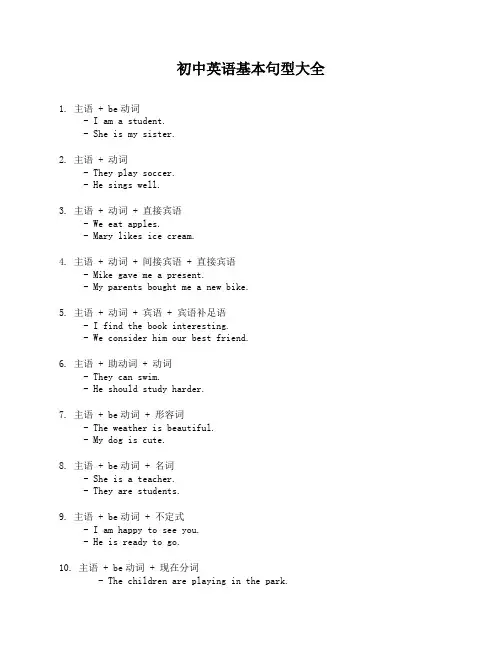
初中英语基本句型大全1. 主语 + be动词- I am a student.- She is my sister.2. 主语 + 动词- They play soccer.- He sings well.3. 主语 + 动词 + 直接宾语- We eat apples.- Mary likes ice cream.4. 主语 + 动词 + 间接宾语 + 直接宾语- Mike gave me a present.- My parents bought me a new bike.5. 主语 + 动词 + 宾语 + 宾语补足语- I find the book interesting.- We consider him our best friend.6. 主语 + 助动词 + 动词- They can swim.- He should study harder.7. 主语 + be动词 + 形容词- The weather is beautiful.- My dog is cute.8. 主语 + be动词 + 名词- She is a teacher.- They are students.9. 主语 + be动词 + 不定式- I am happy to see you.- He is ready to go.10. 主语 + be动词 + 现在分词- The children are playing in the park.- The flowers are blooming beautifully.11. 主语 + be动词 + 过去分词- The house was built last year.- The cake was eaten by the children.12. 主语 + have/has + 过去分词- I have finished my homework.- She has written a letter.13. 主语 + have/has + been + 现在分词- We have been waiting for an hour.- He has been studying all day.14. 主语 + have/has + been + 过去分词- They have been invited to the party.- She has been praised for her hard work.15. 主语 + was/were + 动词的-ing形式- I was reading a book when he called.- They were playing basketball at that time.16. 主语 + 动词不定式- You should listen carefully.- We need to study for the test.17. 主语 + 即将/打算 + 动词原形- I am going to visit my grandparents next week.- They are planning to go on a trip.18. 主语 + can/could + 动词原形- She can swim.- They could speak Chinese when they were young.19. 主语 + must/mustn't + 动词原形- You must finish your homework before you go out.- They mustn't smoke in the building.20. 主语 + may/might + 动词原形- He may come to the party tonight.- It might rain tomorrow.21. 主语 + should + 动词原形- We should help people in need.- You should apologize for your mistake.22. 主语 + would like + to + 动词原形- I would like to go shopping with you.- They would like to eat dinner at the restaurant.23. 介词短语作状语- She went to school by bus.- We played soccer in the park.24. 介词短语作定语- The book on the table is mine.- The girl with long hair is my sister.25. 定语从句- The woman who is wearing a red dress is my mother.- The book that I borrowed from the library is very interesting.26. 状语从句- I will go swimming if it is sunny tomorrow.- She cried because she failed the exam.27. 名词性从句- What he said is true.- I don't know where she lives.28. 并列句- He likes apples, but he doesn't like oranges.- I want to go to the movies, and she wants to stay home.29. 条件句- If it rains, we won't go to the park.- She will buy a new dress if she has enough money.30. 倒装句- Never have I seen such a beautiful sunset.- Not only did he study English, but he also learned French.以上是初中英语基本句型大全,包括了主谓结构、宾语结构、状语结构、从句等等。
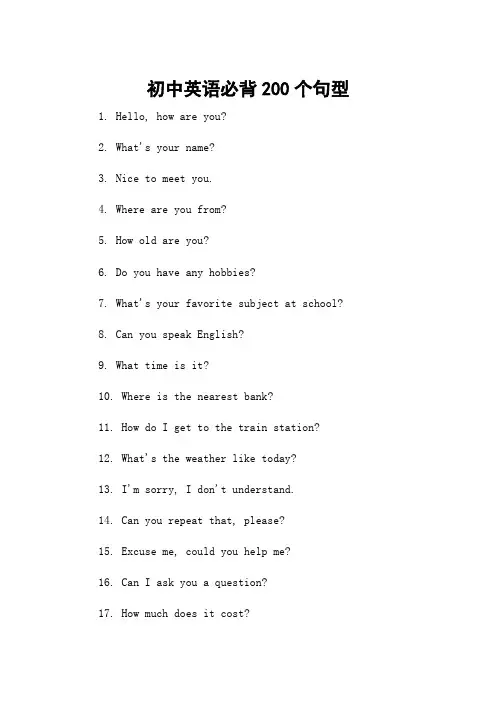
初中英语必背200个句型1. Hello, how are you?2. What's your name?3. Nice to meet you.4. Where are you from?5. How old are you?6. Do you have any hobbies?7. What's your favorite subject at school?8. Can you speak English?9. What time is it?10. Where is the nearest bank?11. How do I get to the train station?12. What's the weather like today?13. I'm sorry, I don't understand.14. Can you repeat that, please?15. Excuse me, could you help me?16. Can I ask you a question?17. How much does it cost?18. Is there a restaurant nearby?19. What do you like to do in your free time?20. I'm hungry. Can we get something to eat?21. What's your favorite food?22. Do you like sports?23. What's your favorite sport?24. Can you swim?25. What's your favorite movie?26. Have you read any interesting books lately?27. What kind of music do you like?28. Can you play a musical instrument?29. Do you have any siblings?30. Are you an only child?31. Do you have any pets?32. What's your favorite animal?33. Where do you live?34. Do you like living there?35. What's your favorite place to visit?36. Do you like traveling?37. Do you prefer the city or the countryside?38. What's your favorite season?39. Do you like winter?40. What's your favorite holiday?41. Do you celebrate Christmas?42. What's your favorite color?43. Can you speak any other languages?44. Do you like studying English?45. What's your favorite subject at school?46. Do you like math?47. What's your favorite hobby?48. Do you play any sports?49. Have you ever traveled abroad?50. Do you like learning about other cultures?51. What's your dream job?52. Do you know how to cook?53. Can you dance?54. Do you like going to parties?55. What's your favorite type of music?56. Do you like going to concerts?57. What's your favorite TV show?58. Do you like watching movies?59. Can you sing?60. What's your favorite song?61. Do you have any bad habits?62. What's your favorite dessert?63. Do you like going to the beach?64. What's your favorite beach activity?65. Do you like hiking?66. Have you ever climbed a mountain?67. What's your favorite type of exercise?68. Do you like going to the gym?69. Can you ride a bike?70. What's your favorite type of dance?71. Do you like going to museums?72. What's your favorite type of art?73. Do you like shopping?74. Can you draw?75. What's your favorite type of book?76. Do you like going to the library?77. What's your favorite type of movie?78. Do you like going to the theater?79. Can you do any magic tricks?80. What's your favorite type of magic trick?81. Do you like doing puzzles?82. What's your favorite type of puzzle?83. Do you like playing video games?84. What's your favorite type of video game?85. Can you juggle?86. What's your favorite type of circus act?87. Do you like going to amusement parks?88. What's your favorite amusement park ride?89. Do you like gardening?90. What's your favorite type of plant?91. Can you do any DIY projects?92. What's your favorite type of DIY project?93. Do you like cooking?94. What's your favorite type of food to cook?95. Can you sew?96. What's your favorite type of clothing to sew?97. Do you like playing board games?98. What's your favorite type of board game?99. Can you write poetry?100. What's your favorite type of poetry?101. Do you like doing crafts?102. What's your favorite type of craft?103. Can you do any magic tricks?104. What's your favorite type of magic trick? 105. Do you like doing puzzles?106. What's your favorite type of puzzle?107. Do you like playing video games?108. What's your favorite type of video game? 109. Can you juggle?110. What's your favorite type of circus act? 111. Do you like going to amusement parks?112. What's your favorite amusement park ride?113. Do you like gardening?114. What's your favorite type of plant?115. Can you do any DIY projects?116. What's your favorite type of DIY project? 117. Do you like cooking?118. What's your favorite type of food to cook? 119. Can you sew?120. What's your favorite type of clothing to sew? 121. Do you like playing board games?122. What's your favorite type of board game? 123. Can you write poetry?124. What's your favorite type of poetry?125. Do you like doing crafts?126. What's your favorite type of craft?127. Can you do any magic tricks?128. What's your favorite type of magic trick? 129. Do you like doing puzzles?130. What's your favorite type of puzzle?131. Do you like playing video games?132. What's your favorite type of video game? 133. Can you juggle?134. What's your favorite type of circus act? 135. Do you like going to amusement parks?136. What's your favorite amusement park ride? 137. Do you like gardening?138. What's your favorite type of plant?139. Can you do any DIY projects?140. What's your favorite type of DIY project? 141. Do you like cooking?142. What's your favorite type of food to cook? 143. Can you sew?144. What's your favorite type of clothing to sew? 145. Do you like playing board games?146. What's your favorite type of board game? 147. Can you write poetry?148. What's your favorite type of poetry?149. Do you like doing crafts?150. What's your favorite type of craft?151. Can you do any magic tricks?152. What's your favorite type of magic trick? 153. Do you like doing puzzles?154. What's your favorite type of puzzle?155. Do you like playing video games?156. What's your favorite type of video game? 157. Can you juggle?158. What's your favorite type of circus act? 159. Do you like going to amusement parks?160. What's your favorite amusement park ride? 161. Do you like gardening?162. What's your favorite type of plant?163. Can you do any DIY projects?164. What's your favorite type of DIY project? 165. Do you like cooking?166. What's your favorite type of food to cook? 167. Can you sew?168. What's your favorite type of clothing to sew? 169. Do you like playing board games?170. What's your favorite type of board game? 171. Can you write poetry?172. What's your favorite type of poetry? 173. Do you like doing crafts?174. What's your favorite type of craft?175. Can you do any magic tricks?176. What's your favorite type of magic trick? 177. Do you like doing puzzles?178. What's your favorite type of puzzle? 179. Do you like playing video games?180. What's your favorite type of video game? 181. Can you juggle?182. What's your favorite type of circus act? 183. Do you like going to amusement parks? 184. What's your favorite amusement park ride? 185. Do you like gardening?186. What's your favorite type of plant?187. Can you do any DIY projects?188. What's your favorite type of DIY project?189. Do you like cooking?190. What's your favorite type of food to cook? 191. Can you sew?192. What's your favorite type of clothing to sew? 193. Do you like playing board games?194. What's your favorite type of board game? 195. Can you write poetry?196. What's your favorite type of poetry?197. Do you like doing crafts?198. What's your favorite type of craft?199. Can you do any magic tricks?200. What's your favorite type of magic trick?。
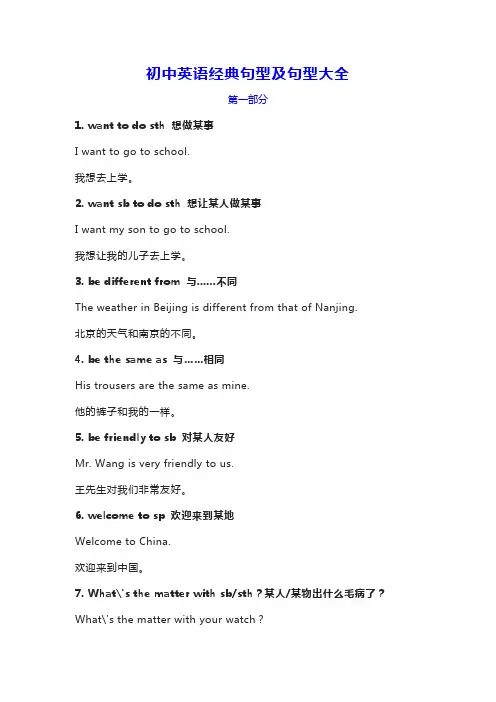
初中英语经典句型及句型大全第一部分1. want to do sth 想做某事I want to go to school.我想去上学。
2. want sb to do sth 想让某人做某事I want my son to go to school.我想让我的儿子去上学。
3. be different from 与......不同The weather in Beijing is different from that of Nanjing.北京的天气和南京的不同。
4. be the same as 与……相同His trousers are the same as mine.他的裤子和我的一样。
5. be friendly to sb 对某人友好Mr. Wang is very friendly to us.王先生对我们非常友好。
6. welcome to sp 欢迎来到某地Welcome to China.欢迎来到中国。
7. What\'s the matter with sb/sth?某人/某物出什么毛病了?What\'s the matter with your watch?你的手表怎么了?8. what to do 做什么We don\'t know what to do next.我们不知道接下来要做什么。
9. let sb do sth 让某人做某事Let him enter the room.让他进入房间。
10. let sb not do sth 让某人不做某事Let him not stand in the rain.让他不要站在雨中。
11. why don\'t you do sth?你怎么不做某事呢?Why don\'t you play football with us?你怎么不和我们踢足球呢?12. why not do sth?怎么不做某事呢?Why not play football with us?为什么不和我们踢足球呢?13. make sb sth 为某人制造某物My father made me a kite.我爸爸给我做了一个风筝。
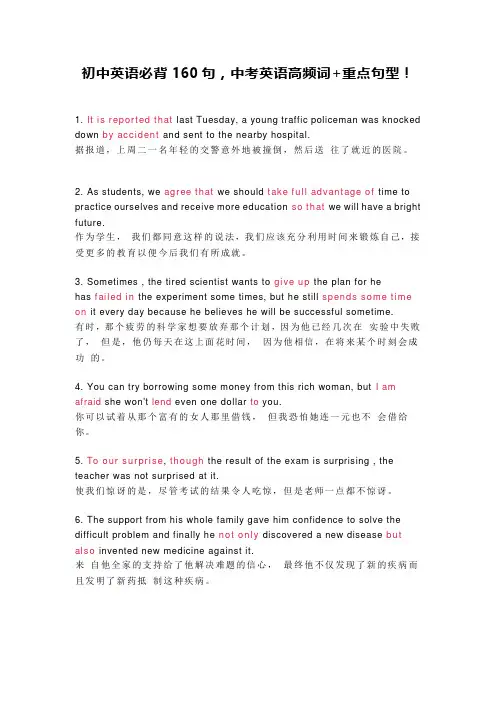
初中英语必背160句,中考英语高频词+重点句型!1. It is reported that last Tuesday, a young traffic policeman was knocked down by accident and sent to the nearby hospital.据报道,上周二一名年轻的交警意外地被撞倒,然后送往了就近的医院。
2. As students, we agree that we should take full advantage of time to practice ourselves and receive more education so that we will have a bright future.作为学生,我们都同意这样的说法,我们应该充分利用时间来锻炼自己,接受更多的教育以便今后我们有所成就。
3. Sometimes , the tired scientist wants to give up the plan for hehas failed in the experiment some times, but he still spends some time on it every day because he believes he will be successful sometime.有时,那个疲劳的科学家想要放弃那个计划,因为他已经几次在实验中失败了,但是,他仍每天在这上面花时间,因为他相信,在将来某个时刻会成功的。
4. You can try borrowing some money from this rich woman, but I am afraid she won't lend even one dollar to you.你可以试着从那个富有的女人那里借钱,但我恐怕她连一元也不会借给你。
5. To our surprise, though the result of the exam is surprising , the teacher was not surprised at it.使我们惊讶的是,尽管考试的结果令人吃惊,但是老师一点都不惊讶。
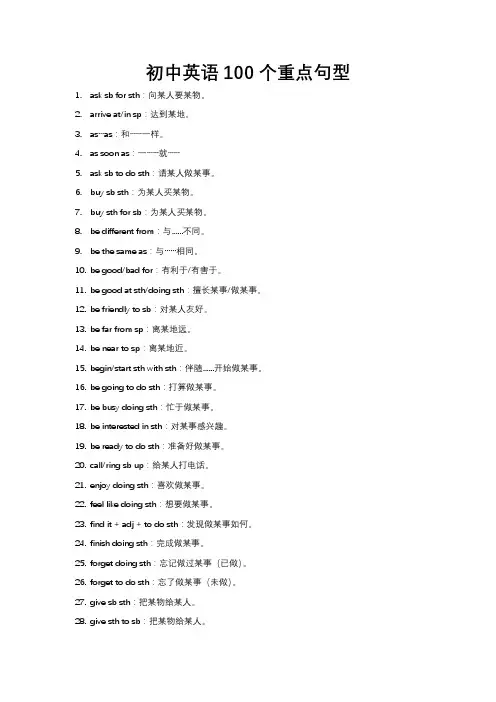
初中英语100个重点句型1.ask sb for sth:向某人要某物。
2.arrive at/in sp:达到某地。
3.as…as:和……一样。
4.as soon as:一……就……5.ask sb to do sth:请某人做某事。
6.buy sb sth:为某人买某物。
7.buy sth for sb:为某人买某物。
8.be different from:与......不同。
9.be the same as:与……相同。
10.be good/bad for:有利于/有害于。
11.be good at sth/doing sth:擅长某事/做某事。
12.be friendly to sb:对某人友好。
13.be far from sp:离某地远。
14.be near to sp:离某地近。
15.begin/start sth with sth:伴随......开始做某事。
16.be going to do sth:打算做某事。
17.be busy doing sth:忙于做某事。
18.be interested in sth:对某事感兴趣。
19.be ready to do sth:准备好做某事。
20.call/ring sb up:给某人打电话。
21.enjoy doing sth:喜欢做某事。
22.feel like doing sth:想要做某事。
23.find it + adj + to do sth:发现做某事如何。
24.finish doing sth:完成做某事。
25.forget doing sth:忘记做过某事(已做)。
26.forget to do sth:忘了做某事(未做)。
27.give sb sth:把某物给某人。
28.give sth to sb:把某物给某人。
29.get to sp:达到某地。
30.go on doing sth:继续做同一件事。
31.go on to do sth:继续做另一件事。

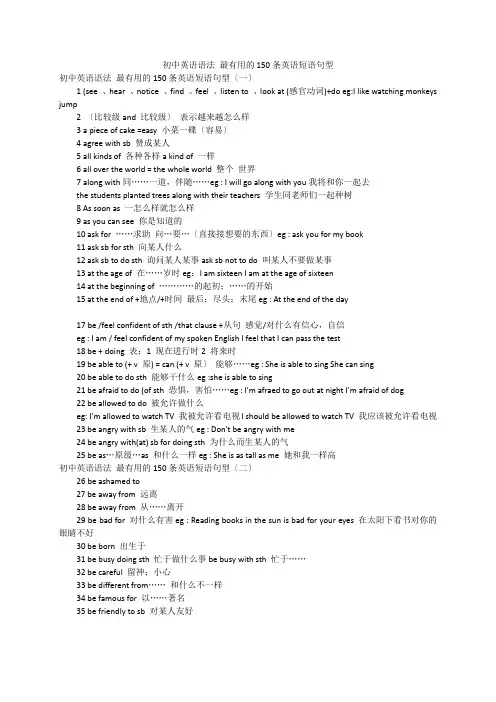
初中英语语法最有用的150条英语短语句型初中英语语法最有用的150条英语短语句型〔一〕1 (see 、hear 、notice 、find 、feel 、listen to 、look at (感官动词)+do eg:I like watching monkeys jump2 〔比较级and 比较级〕表示越来越怎么样3 a piece of cake =easy 小菜一碟〔容易〕4 agree with sb 赞成某人5 all kinds of 各种各样a kind of 一样6 all over the world = the whole world 整个世界7 along with同……一道,伴随……eg : I will go along with you我将和你一起去the students planted trees along with their teachers 学生同老师们一起种树8 As soon as 一怎么样就怎么样9 as you can see 你是知道的10 ask for ……求助向…要…〔直接接想要的东西〕eg : ask you for my book11 ask sb for sth 向某人什么12 ask sb to do sth 询问某人某事ask sb not to do 叫某人不要做某事13 at the age of 在……岁时eg:I am sixteen I am at the age of sixteen14 at the beginning of …………的起初;……的开始15 at the end of +地点/+时间最后;尽头;末尾eg : At the end of the day17 be /feel confident of sth /that clause +从句感觉/对什么有信心,自信eg : I am / feel confident of my spoken English I feel that I can pass the test18 be + doing 表:1 现在进行时2 将来时19 be able to (+ v 原) = can (+ v 原〕能够……eg : She is able to sing She can sing20 be able to do sth 能够干什么eg :she is able to sing21 be afraid to do (of sth 恐惧,害怕……eg : I'm afraed to go out at night I'm afraid of dog22 be allowed to do 被允许做什么eg: I'm allowed to watch TV 我被允许看电视I should be allowed to watch TV 我应该被允许看电视23 be angry with sb 生某人的气eg : Don't be angry with me24 be angry with(at) sb for doing sth 为什么而生某人的气25 be as…原级…as 和什么一样eg : She is as tall as me 她和我一样高初中英语语法最有用的150条英语短语句型〔二〕26 be ashamed to27 be away from 远离28 be away from 从……离开29 be bad for 对什么有害eg : Reading books in the sun is bad for your eyes 在太阳下看书对你的眼睛不好30 be born 出生于31 be busy doing sth 忙于做什么事be busy with sth 忙于……32 be careful 留神;小心33 be different from……和什么不一样34 be famous for 以……著名35 be friendly to sb 对某人友好37 be full of 装满……的be filled with 充满eg: the glass is full of water the glass is filled with water38 be glad+to+do/从句39 be going to + v(原〕将来时40 be good at(+doing) = do well in 在某方面善长, 善于……41 be good for 对什么有好处eg : Reading aloud is good for your English42 be happy to do 很快乐做某事43 be helpful to sb 对某人有好处eg : Reading aloud is helpful to you 大声朗读对你有好处Exercising is helpful to your bady 锻炼对你的身体有好处44 be in good health 身体健康45 be in trouble 处于困难中eg : She is in trouble They are in tronble46 be interested in 对某方面感兴趣48 be like 像……eg : I'm like my mother49 be mad at 生某人的气50 be made from 由……制成(制成以后看不见原材料)初中英语语法最有用的150条英语短语句型〔三〕51 be made of 由……制成(制成以后还看得见原材料)52 be not sure 表不确定53 be on a visit to 参观54 be popular with sb 受某人欢迎55 be quiet 安静56 be short for 表**的缩写eg: 陶is short for 陶俊杰57 be sick in bed 生病在床58 be sorry to do sth be sorry for sb eg : I am sorry for you59 be sorry to hear that60 be sorry to trouble sb eg : I am sorry to trouble you61 be strict in doing sth 严于做某事eg : He's strict in obeying noles62 be strict with sb 对某人要求严格eg: Some students are not strict with them selves 这些学生对自己不严格63 be strict with sb in sth 某方面对某人严格64 be supposed to do 被要求干什么65 be sure 表确定66 be sure of doing sth 对做某事有信心eg: He is sure of winning I am sure of learning English well67 be sure of sth 对做某事有信心eg: I'm sure of my head (my teacher 我相信我的大脑〔老师〕68 be sure that sth 对做某事有信心eg: I'm suer that he can pass the test 我相信他能通过考试69 be sure to do sth一定会做某事eg: We are sure to pass the test 我们一定会通过这次考试We are sure to learn English well 我们一定能学好英语70 be terrified of + 名/动doing 害怕……71 be terrified to do sth 害怕做某事72 be the same as …和什么一样73 be used to doing sth 习惯做某事eg: My father is used to getting up early 我爸爸习惯早He is used to sleeping in class 他习惯上课睡觉74 be worth doing 值得做什么75 be(feel) afraid to do sth 害怕做某事be afraid of sth 害怕某物be afraid that 丛句76 because+句子because of +短语eg : He was late because he had a headache He was late because of his headache77 begin to do = start to do 开始做某事start…with…=begin…with…以什么开始什么eg : Let's begin the game with the song I begin to go home78 between…and…两者之间79 borrow sth from sb 向……借……lend sth to sb ( lend sb sth 借给……什么东西eg : I borrowed a pen from him he lent a pen to me ( he lent me a pen80 both = the same(as) = not different(from) 表相同81 bother 打搅bother sb to do stheg : I'm sorry to bother you ,but can you tell me to way to the station我十分抱歉打搅你,但是你能告诉我怎么去车站the problem has been bothering me for weeks 这个问题困扰了我几个周了He's bothering me to lend him money82 by the end of 到……为止83 call sb sth eg : We call him old wang84 care 关心eg : Don't you care about this country's future 你为什么不关心国家的未来85 catch up with sb 赶上某人86 chat with sb 和某人闲谈take sb to + 地点带某人去某地91 consider + doing 考虑做什么eg : Why not consider going to lu zhou 为什么不考虑去泸州92 dance to 随着……跳舞eg : She likes dancing to the music 她喜欢随着音乐跳舞93 decide to do sth 决定做某事94 do a survey of 做某方面的调查95 do better in 在……方面做得更好96 do wrong 做错97 Don't forget to do sth 不要忘了做某事98 Don't mind +doing /从句/名词不要介意……99 each +名〔单〕每一个…eg : Each student has many books 每一个学生都有一些书100 end up +doing初中英语语法最有用的150条英语短语句型〔四〕101 enjoy +doing喜欢102 escape from 从……逃跑eg: The prisoners have escaped from the prison犯人从监狱里逃跑出来103 expect to do sth 期待做某事104 fall down 摔下来fall off 从哪摔下来105 fall in love with sb /sth 爱上什么106 far from 离某地远eg : The school is far from my home107 find +it +adj +to do 发现做某事怎么样108 find sb/sth +adj 发现什么怎么样eg : I find the book interesting109 finish 完成+doing〔名词〕110 fit to sb = be fit for sb 适合某人111 forget to do 没有做而忘了forget doing 做了而又忘了eg: Don't forget to go home I forget closing door112 from…to…从某某到某某eg: From me for her113 get /have sth down 做完,被〔别人〕做…eg: I have my hair cut 我理了发(头发被剪了〕Tom got his bad tooth pulled out 汤母把他的坏牙拔掉了〔被牙医拔掉了〕115 get along well with sb = get on well with sb 与某人相处得好116 get along with sb = get on with sb 与某人相处117 get ready for = be ready for为什么而准备eg : I get ready for math I am ready for math118 get sb in to trouble 给某人麻119 get sb to do sth120 get…from…从某处得到某物121 give a talk 做报告eg: He is give a tall122 give sth to sb give sb sth 给某人某物123 go fish 钓鱼go swimming 游泳124 go on to do 去做下一件事go on doing 继续做这件事125 go out away from go out of初中英语语法最有用的150条英语短语句型〔五〕126 go to school 上学〔用于专业的〕go to the school 去学校〔不一定是上学〕127 good way to 好方法128 hate to do 讨厌没做过的事hate doing 讨厌做过的事129 have a party for sb 举办谁的晚会130 have a talk 听报告谈一谈131 have been doing 现在完成进行时eg : You have been talking You have been sleeping since132 have been to …( 地方〕……去过某过地方have gone to …〔地方〕去了某地还没回来133 have fun +doing 玩得快乐134 have sth to do 有什么事要做eg: I have a lot of homework to do 我有很多家庭作业要做I have nothing to do 我没什么事情做136 have trouble (problem) (in) doing sth 做什么事情有麻烦138 have…(时间)…off 放……假eg: I have month off 我请一个月得假140 help a lot 很大用处141 help sb with sth \one's sth 帮助某人某事〔某方面〕help sb (to) do sth 帮助某人做某事142 hope to do sth 希望做某事143 How about(+doing) = What about(+doing)144 how do you like = what do you think of 你对什么的看法145 if : 是否=wethereg: I don't know if (wether) I should go to the party 我不知道我是否应该去参加晚会146 if :如果,假设〔全部接一般时态〕+条件语态从句eg: I'll go to LuZhou if it does't rain 假设明天不下雨,我就去泸州If they change the plan they will let me know 假设他们要改变方案,他们会让我知道的I'll go to England ,if I have enough money next year 如果我明年由足够的钱,我就要去英国147 in one's opinion = sb think 某人认为148 in some ways 在某些方面149 in the end = finally(adv) 最后150 in the north of…什么在什么的北方〔north 北sowth 南west 西east 东〕。
初中英语常见60个句型1.as …as^............ 一样中间必须用形容词或副词原级。
例如:This classroom is as big as that one.这间教室和那间一样大。
He runs as fast as Tom. 他和汤姆跑的一样快。
否定结构:not as/so …而如••土。
上面的两个句子可分别改为:This classroom is not as/so large as that one.这间教室不如那间大。
He doesn ' t run as/so fasas Tom.他跑得不如汤姆快。
2.as soon as 一.... 就.....用来引导时间状语从句。
若主句是一般将来时,从句要用一般现在时。
例如:I ' ll tell him the plan as soon as I see him.我一看到他就告诉他这个计划。
He' ll go home as soon as he finishes his work.他一完成工作就回家。
3.be busy/enjoy/hate/go on/finish doing sth. 忙于 /喜欢 /讨厌 /继续 /完成做某事在enjoy, finish, hate, go on, be busy 等词语后,一般用动词-ing形式作宾语。
例如: Lin Tao is busy making a model plane.林涛正忙着做飞机模型。
My mother enjoys taking a walk after supper.我妈妈喜欢晚饭后散步。
I hate watching Channel Five.我讨厌看五频道。
When someone asked him to have a rest, he just went on working.当有人让他休息一会儿时,他仍继续工作。
I have finished writing the story.我已经写完了故事。
初中英语知识点句型总结一、时态1. 一般现在时:表示经常发生的动作或现在的状态。
- 例句:She goes to school every day.2. 现在进行时:表示正在进行的动作。
- 例句:He is reading a book now.3. 一般过去时:表示过去发生的动作或状态。
- 例句:They visited the museum last week.4. 过去进行时:表示过去某个时间点正在进行的动作。
- 例句:She was watching TV when I called her.5. 一般将来时:表示将来会发生的动作或状态。
- 例句:I will travel to Japan next year.6. 现在完成时:表示过去发生的动作对现在造成的影响或结果。
- 例句:He has finished his homework.7. 现在完成进行时:表示从过去某时刻开始一直持续到现在的动作。
- 例句:She has been studying English for five years.二、语态1. 被动语态:表示动作的承受者。
- 例句:The book was written by the author.三、情态动词1. can/could:表示能力或许可。
- 例句:She can speak three languages.2. may/might:表示可能性或许可。
- 例句:It might rain later.3. must:表示必须或强烈推测。
- 例句:You must wear a seatbelt in the car.4. should:表示建议或应当。
- 例句:You should eat more vegetables.四、非谓语动词1. 动名词:作为名词使用,表示动作。
- 例句:Swimming is my favorite sport.2. 分词(现在分词和过去分词):作为形容词或副词使用。
初中英语重点句型归纳一、陈述句型1. 主语 + be动词 + 表语例句:I am a student.2. 主语 + 动词 + 宾语例句:Tom likes playing basketball.3. 主语 + 动词 + 间接宾语 + 直接宾语例句:My mother bought me a new book.4. 主语 + 动词 + 宾语 + 宾语补足语例句:We elected him monitor.5. 主语 + 动词 + 宾语 + 宾语补足语 + 宾语补足语例句:They made him chairman.6. 主语 + do/does + not + 动词原形例句:She does not like swimming.7. Do/Does + 主语 + 动词原形例句:Do you like English?8. 主语 + have/has + 过去分词例句:He has finished his homework.9. 主语 + have/has + not + 过去分词例句:They haven't seen the film yet.10. Have/Has + 主语 + 过去分词例句:Have you ever visited Beijing?11. There be句型例句:There is a book on the desk.12. It be + adj. + 不定式例句:It is important to learn English well.13. It is + adj. + for + 人 + to + 不定式例句:It is difficult for me to solve the math problem.二、疑问句型1. Yes/No问句:句型为:Do/Does + 主语 + 动词原形?例句:Do you like English?2. 特殊疑问句:以特殊疑问词(what, where, when, why, who, how等)开头。
中考英语经典句型1.主语 + 动词(一般现在时)[例]I study English.2.主语 + 动词(一般过去时)[例]She visited the museum.3.主语 + 动词(一般将来时)[例]They will go to the beach.4.主语 + 动词(进行时)[例]He is watching TV.5.主语 + 动词(过去进行时)[例]She was studying when the phone rang.6.主语 + 动词(将来进行时)[例]We will be playing soccer at 4 PM.7.主语 + 动词(完成时)[例]They have finished their homework.8.主语 + 动词(过去完成时)[例]I had already eaten when they arrived.9.主语 + 动词(将来完成时)[例]By this time next year, I will have graduated. 10.主语 + 动词(被动语态)[例]The book was written by the author.11.主语 + 助动词 + 动词(情态动词)[例]You should eat your vegetables.12.主语 + 助动词 + have + 过去分词(情态动词的完成时)[例]She must have forgotten her keys.13.主语 + 动词 + 双宾语[例]He gave me a gift.14.主语 + 动词 + 间接宾语 + 直接宾语[例]She sent me a letter.15.主语 + 动词 + 宾语 + 补语[例]They made him the captain.16.主语 + 动词 + 宾语 + 宾补[例]I find the movie interesting.17.主语 + 系动词 + 补语[例]She is a doctor.18.主语 + 系动词 + 补语 + 宾补[例]The cake smells delicious.【实际例子】1.一般现在时I play soccer every Sunday.我每个星期天都踢足球。
初中英语 100 句经典句型Eg. Let him enter the room.1.welcome to sp 欢迎到某地Eg. Welcome to China.2.What 's the matter with sb./ sth? 出什么毛病了?Eg. What 's the matter with your watch?3.be different from 与--- 不同Eg. The weather in Beijing is different from that of Nanjing.4.be the same as 与⋯⋯相同Eg. His trousers are the same as mine.5.be friendly to sb. 对某人友好Eg. Mr. Wang is very friendly to us.6.want to do sth. 想做某事Eg. I want to go to school.7.want sb. to do sth. 想让某人做某事Eg. I want my son to go to school.8.what to do 做什么Eg. We don ' t know what to do next.9.let sb. do sth. 让某人做某事10.let sb. not do sth. 让某人不做某人Eg. Let him not stand in the rain.11.why don 't you do sth? 怎么不做某事呢?=Eg. Why don ' t you play football with us?12.why not do sth.? 怎么不做某事呢?Eg. Why not play football with us?13.make sb. sth. 为某人制造某物=Eg. My father made me a kite.14.make sth for sb. 为某人制造某物Eg. My father made a kite for me.15.What ⋯mean by ⋯?做⋯⋯是什么意思?Eg. What do you mean by doing that?16.like doing sth. 喜爱做某事Eg. Jim likes swimming.17.like to do sth. 喜爱做某事Eg. He doesn ' t like to swim now.18. feel like doing sth. 想做某事Eg. I feel like eating bananas.19.would like to do sth. 愿意做某事Eg. Would you like to go rowing with me?20.would like sb. to do sth. 愿意某人做某事Eg. I' d like you to stay with me tonight.21.make sb. do sth. 逼使某人做某事Eg. His brother often makes him stay inthe sun.22.let sb. do sth. 让某人做某事Eg. Let me sing a song for you.23. have sb. do sth.使某人做某事Eg. You shouldn ' t have the studentswork so hard.24. be far from sp 离某地远Eg. His school is far from his home.25.be near to sp 离某地近Eg. The hospital is near to the post office.26.be good at sth./doing sth. 擅长某事Eg. We are good at English.They are good at boating.27.It takes sb. some time to do sth. 某人花多少时间做某事Eg. It took me more than a year to learn to draw a beautiful horse in five minutes.28.sb. spends some time/money(in )doing sth. 某人花多少时间做某事Eg. I spent twenty years in writing the novel.29.sb. spends some time/money onsth. 某事花了某人多少时间/ 金钱Eg. Jim spent 1000 yuan on the bike.30.sth. costs sb. some money. 某物花了某人多少钱Eg. The bike cost Jim 1000 yuan.31.sb. pays some money for sth. 某人为某物付了多少钱Eg. Jim paid 1000 yuan for the bike.32.begin/start with sth. 开始做某事Eg. The started the meeting with a song.33.be going to do sth. 打算做某事34.call A B 叫 A B/ 做某事Eg. We are going to study in Japan. Eg. You ' d better study hard at English.第 3 页 共 7 页Eg. They called the village Gumtree.35. thank sb. for sth./doing sth.感谢某人做某事Eg. Thank you for your help.Thank you for helping me.36. What ⋯⋯ for? 为什么Eg. What do you learn English for? 37. How/ what about doing sth.?做某事怎么样?Eg. How about going fishing?38. S +be+ the+ 最高级 +of/in 短语 =Eg. Lucy is the tallest in her class.39. S + be + 比较级 +than any other + n.Eg. Lucy is taller than any other student in her class.40. have to do sth. 不得不做某事Eg. I have to go home now.41. had better do sth. 最好做某事42. had better not do sth. 最好别做某事Eg. You ' d better not stay up.43. help sb. to do sth. 帮助某人做某事Eg. Lucy often helps Lily to wash her clothes.44. help sb. do sth. 帮助某人做某事Eg. He usually helps me learn English.45. help sb. with sth.帮助某人做某事Eg. I sometimes help my mother with the housework.46. make it + 时间把时间定在几点Eg. Let ' s make it 8:30.47. take sb. to sp 带某人到某地Eg. Mr. Wang will take us to the Summer Palace next Sunday.49. have nothing to do( with sb )与某人没有关系Eg. That has nothing to do with me.50. 主语 + don 't think + 从句 认为⋯⋯ 不⋯⋯Eg. We use pens to write.60. show sb. Sth给某人看某物 =Eg. Please show me the map. 61.show sth. to sb.把某物给某人看Eg. Please show the map to me.62. pass sb. sth. 把某物递给某人Eg. Pass me the cup of tea.63. pass sth. to sb. 把某物递给某人Eg. Pass the cup of tea to me.64. buy sb. sth.为某人买某物 =Eg. Mother bought me a bike.65. buy sth. for sb. 为某人买某物Eg. Mother bought a bike for me.66. give sb. sth 把某物给某人 =Eg. Jim gave me an Englishdictionary.67. give sth. to sb. 把某物给某人Eg. Jim gave an English dictionary to me.68. get to sp 达到某地 =Eg. I got to Beijing on the morningEg. I don ' t think it will rain tomorrow.51. It ' s + adj.+ for sb. to do sth. 做某事对某人来说怎么样Eg. It is lucky for you to go to London.52. How + adj/ adv +主 + 谓!多么⋯⋯啊!Eg. How beautiful the flower is!53. what + a/an + adj + [] + 主 + 谓!Eg. What an beautiful flower it is!54. What + adj+ pl./[u] +主 + 谓!Eg. What bad weather it is today!55. find it + adj+ to do sth. 发现做某事 如何Eg. I find it hard to speak English well!56. ask sb. for sth. 向某人要某物Eg. They often ask me for money.57. need to do sth. 需要做某事Eg. You need to study hard.58. need sth 需要某物Eg. I don ' t need your money.59. use A to do B 用 A 来做 Bof May 1st.69. arrive at /in sp达到某地= 77. start to do sth. 开始做某事Eg. I arrived in Beijing on the morning of May 1st.70.reach sp 达到某地Eg. I reached Beijing on the morning of May 1st.71.hope to do sth. 希望某人做某事Eg. I hope to see you soon.72.there is sth. wrong with sth./sb. 某物出设么毛病了=Eg. There is something wrong my car.73.sth. is wrong with ⋯⋯某物出设么毛病了Eg. Something is wrong with my car.74.How do you like sth? 你认为⋯⋯怎么样?=Eg. How do you like Beijing?75.What do you think of sth.? 你认为⋯⋯怎么样?Eg. What do you think of Beijing?76.start doing sth. 开始做某事Eg. I started learning English in 1983.Eg. I started to watch TV after finishing my homework.78.finish doing sth.完成作某事Eg. I finished cleaning my car just now.79.enjoy doing sth. 喜欢做某事Eg. They all enjoy living and working in China.80.What / when / where / who / something / anything / nothing else 别的什么/何时/ 何地/谁⋯⋯Eg. What else do you want to buy?Where else have you gone?Who else have you played with?I have nothing else to tell you.Would you like something else?81.forget doing sth. 忘记做过某事了Eg. I forgot turning off the lights. Look, it is dark in the room.82.forget to do sth. 忘了做某事了Eg. I forgot to turn off the lights.Could83. remember doing sth. 记得做过某事90.go on to do sth. 继续作谋事you go back and shut the off?83. remember doing sth. 记得做过某事90.go on to do sth. 继续作谋事Eg. I remembered returning your money.You are so forgetful.84.remember to do sth. 记住做某事Eg. Remember to bring me some money. I ' ve run out of it.85.stop to do sth. 停下来去做某事Eg. He stopped to talk with Mary when she enter the office.86.stop doing sth. 停止做某事Eg. The students stopped talking when the teachet came in.87.watch/see/hear sb. do sth. 观看/ 看见/ 听见某人做某事Eg. I saw you pick an apple just now.88.watch/see/hear sb. doing sth. 观看/看见/ 听见某人在做某事Eg. I saw you playing basketball with your classmates on the playground last Sunday.89.go on doing sth. 继续作谋事Eg. He went on reading after a shortEg. He went on to read after finishing wash the dishes.91.go on with sth. 继续某事Eg. He went on with his work after a short rest.92.say hello/goodbye to sb. 向某人告别Eg.I came to say good-bye to you.93.be busy doing sth. 忙于做某事Eg. They are busy planting trees on the hill.94.be interested in sth. 对某事感兴趣Eg. English is very interesting. We areall interested in it.95.tell sb. to do sth. 告诉某人做某事Eg. Mother told me to go shopping with her.96.ask sb. to do sth. 请某人做某事Eg. Jim ask me to go rowing with him.97.call/ring sb. up 给某人打电话Eg. I will call you up tommow.83. remember doing sth. 记得做过某事90.go on to do sth. 继续作谋事rest.98. be ready to do sth. 准备做某事Eg. We are ready to have lunch.99. go doing sth. 去做某事Eg. Let ' s go fishing.100. prefer A/doing A to B/doing B 喜欢A/ 做 A 而非B/ 做 B Eg. Lucy prefers English to French.I prefer staying at home to going to the cinema.。
初中英语经典句型这60个句型中包含词汇、短语、固定搭配和语法等全方位的知识点,因此,它们的重要性是不言而喻的!1. as…as和……一样中间必须用形容词或副词原级。
例如:This classroom is as big as that one.这间教室和那间一样大。
He runs as fast as Tom.他和汤姆跑的一样快。
不如……”。
上面的两个句子可分别改为:否定结构:not as/so…as,“This classroom is not as/so large as that one.这间教室不如那间大。
He doesn’t run as/so fast as Tom.他跑得不如汤姆快。
2. as soon as一……就……用来引导时间状语从句。
若主句是一般将来时,从句要用一般现在时。
例如:I’ll tell him the plan as soon as I see him.我一看到他就告诉他这个计划。
He’ll go home as soon as he finishes his work.他一完成工作就回家。
3. be busy/enjoy/hate/go on/finish doing sth.忙于/喜欢/讨厌/继续/完成做某事在enjoy, finish, hate, go on, be busy等词语后,一般用动词-ing形式作宾语。
例如:Lin Tao is busy making a model plane.林涛正忙着做飞机模型。
My mother enjoys taking a walk after supper.我妈妈喜欢晚饭后散步。
I hate watching Channel Five.我讨厌看五频道。
When someone asked him to have a rest, he just went onworking.当有人让他休息一会儿时,他仍继续工作。
I have finished writing the story.我已经写完了故事。
用……装满......;be filled with充满了……;be full of4. fill…with充满了......①be filled with说明由外界事物造成的此种状态,表示被动。
例如:The box is filled with food.盒子里装满了食物。
②be full of说明主语处于的状态。
此外,还可表示程度,意为“非常”。
例如:The patient’s room is full of flowers.那个病人的房间摆满了花。
The young man is full of pride.那个年轻人非常骄傲。
③这两种结构还可以相互改写。
例如:I fill the box with food. The box is full of food.5. be good/bad for有利于/有害于……此句型是:be+adj.+for+n.结构。
例如:Doing morning exercises is good for your health.做早操对你的健康有益。
Always playing computer games is bad for your study.总玩电脑游戏对你的学习不利。
6. be used to(doing) sth.习惯于……后必须接名词或动名词,可用于现在、过去、将来的多种时态。
be 可用get,become来代替。
例如:He is used to life in the country.(He is used to living in the country.)他习惯于乡村生活。
He will get used to getting up early.他将会习惯于早起。
注意:be used to do的意思是“被用来做……”。
例如:Wood is used to make paper.木材被用来造纸。
7. both…and…两者都……用来连接两个并列成分;当连接两个并列主语时,其后谓语动词用复数。
例如:Both the students and the teachers will go to the History Museum tomorrow.不论老师还是学生明天都会去历史博物馆。
8. can’t help doing sth.禁不住做某事help在此的意思是“抑制,忍住”,其后接动词-ing形式。
例如:His joke is too funny. We can’t help laughing.他的笑话太有趣了,我们禁不止笑了起来。
9. sth. costs sb. some money某物花费某人多少钱此句型的主语是物。
cost一词带的是双宾语,它的过去式、过去分词和原型一样。
This book cost me five yuan.这本书花了我五元钱。
不是……就是……,或者……或者……10. either…or…用来连接两个并列成分,当连接并列主语时,谓语动词与邻近的主语保持一致。
You may either stay here or go home.你可以呆在这儿,也可以回家。
Either she or I am right. = Either I or she is right.不是她对就是我对。
11. enough (for sb.) to do sth.足够……做……在此结构中,for用来引出不定式的逻辑主语。
例如:The ice isn’t thick enough for you to walk on.这冰还没有厚到你可以在上面走的程度。
12. feel like doing sth.想要做某事此处like为介词,后面跟动词-ing形式。
此句型与would like to do sth.同义。
例如:I feel like drinking a cup of milk.我想喝一杯牛奶。
13. feel/find/think it adj./n. to do sth.认为某事……在此结构中it为形式宾语,不定式短语作真正的宾语。
例如:I find it very interesting to play football.我发现踢足球很有趣。
She thinks it her duty to help us.她认为帮助我们是她的职责。
14. get ready for sth./to do sth.get ready for sth.意为“为某事做准备”;get ready to do sth.意为“准备做某事”例如:We are getting ready for the meeting.我们正在为会议做准备。
They were getting ready to have a sports meet at that moment.他们那时正准备开运动会。
15. get/receive/ a letter from收到……的来信相当于hear from例如:Did you receive a letter from John?你收到约翰的来信了吗?I got a letter from my brother yesterday.我昨天收到了我弟弟的一封来信。
16. had better (not) do sth.最好(别)做某事had better为情态动词,其后需用动词原形。
had better常用缩写,变成’d better,其否定形式是在其后直接加not。
例如:We had better go now. = We’d better go now.我们最好现在走吧。
You’d better not go out because it is windy.今天刮风,你最好别出去了。
17. have sth. done使(某事)完成(动作由别人完成)sth.为宾语,done为过去分词作补语。
例如:We had the machine repaired.我们请人把机器修好了。
注意区分:We have repaired the machine.我们(自己)已经修好了机器。
18. help sb. (to) do sth./with sth.帮助某人(做)某事其中的to可以省略。
例如:I often help my mother with housework.我常常帮助妈妈做家务。
Would you please help me (to) look up these words?请你帮助我查查这些词好吗?你认为……怎么样?19. How do you like…?同义。
例如:与what do you think of …?How do you like the weather in Beijing?你认为北京的天气怎么样?你觉得这部新电影如何?我认我/相信……不……20. I don’t think/believe that…其中的not是对宾语从句进行否定而不是对主句否定(否定前移)。
that可省略。
例如:I don’t think it will rain.我认为天不会下雨。
I don’t believe the girl will come.我相信那女孩不会来了。
碰巧……21. It happens that…相当于happen to do。
例如:It happened that I heard their secret.可改写为:I happened to hear their secret.我碰巧听到了他们的秘密。
一段时间+since从句自从某时起做某件事情已22. It’s/has been +经一段时间了该句型中since引导的时间状语从句常用一般过去时。
例如:It’s twenty years since he came here.他来这里已经20年了。
It has been six years since he married Mary.他和玛丽结婚已经六年了。
23. It is +adj./n. + for sb. to do sth.做某事对某人来说……It是形式主语,真正的主语是不定式to do sth。
例如:It’s not easy for us to study English well.对我们来说学好英语并不容易。
It’s a good idea for us to travel to the south.去南方旅行对我们来说是个好主意。
24. It’s + adj. + of sb. to do sth.It是形式主语,to do sth.是真正的主语,当表语(即形容词)能对逻辑主语描述时,常用介词of,而不用for。